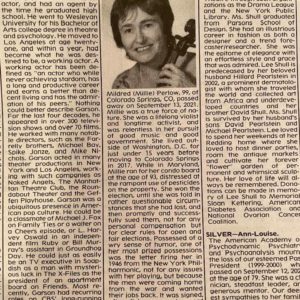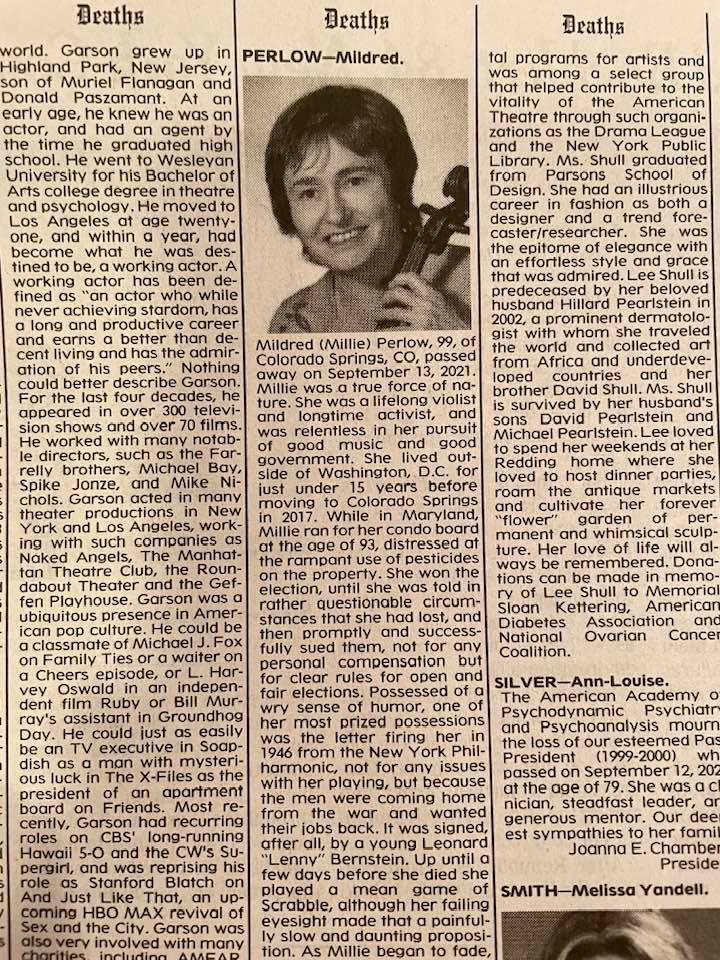NY violist, fired by Bernstein because she was female, dies at 99
RIPThe Washington Post memorial notice for the late Mildred Perlow reads, in part:
…Possessed of a wry sense of humor, one of her most prized possessions was the letter firing her in 1946 from the New York Philharmonic, not for any issues with her playing, but because the men were coming home from the war and wanted their jobs back. It was signed, after all, by a young Leonard “Lenny” Bernstein. …
She met and ultimately married Austin Perlow, a career newspaperman. They were married for 51 years until his death in 1996…

UPDATE: Leonard Slatkin reminds us that Bernstein hs no position of authority at the Philharmonic at this time. he was, however, music director of the New York City Symphony, founded by Leopold Stokowski with support from Mayor La Guardia to provide reasonably priced tickets for working people.It would have been from this orchestra that Lenny fired his women.






RIP. What a splendid character. Life lived to the full.
A rather “glass half-empty” headline. Presumably the warriors were (reasonably enough) guaranteed their jobs back if they returned from the war, so Bernstein (aged 27 at the time) will have had precious little discretion in the matter.
Exactly. I am a professional musician, who happens to be female, and who happens to have played under Lenny for years. I can tell you without a doubt that what you said is exactly what the situation was. Lenny had no issues with female musicians for simply being female. Smh, the media is really ridiculous sometimes.
Bernstein had no affiliation with the NY Phil in 1946 and could not possibly have signed such a letter. Perlow must have been in the New York City Symphony, which Bernstein was leading as of 1946.
Good call.
Norman, your blog is an essential service to all of us in the profession. Please don’t devalue it with opportunistic (and inaccurate) headlines like this one. Her being female was coincidental. In those days, it was only men who were called up to fight. If NYPhil musicians who enlisted to fight Hitler weren’t guaranteed their jobs back when they came home (if they survived) they should have been. And those musicians – male or female – who substituted for those brave men, should’ve been honoured by the opportunity.
Few women were called to serve in the war. After the war, men were given their jobs back. She was therefore fired because she was a woman.
Also fired because she had not fought in the war in Europe or the Pacific. I’m not sure if you are aware that there are laws protecting US service members who are deployed; no such protection is given to those who serve in their stead.
No, the only logical conclusion is that she was released because she was in a temporary position and the incumbent returned.
I don’t follow your logic. If she had been a man instead, then would you say that she was fired because he was a man? I doubt that the subs were exclusively women, although I don’t know for sure.
Nothing incidental about it. She was denied opportunities to enter the orchestra pre-war because of her gender, got an opportunity because the men were away, and the men reverted to a system excluding women when they came back. The gender issue is, in fact, central.
Do you honestly think that the proper way to handle this would have been for the people who fought WWII, risked their lives, were lucky enough to survive – and THEN be told upon returning that their job was taken by someone else? Great way to strengthen confidence and fighting spirit among the soldiers…
Hugo — in my reading, Emil is talking about the fact that, because she was a woman, she wasn’t able to compete for a job in the orchestra in the first place. If she had been allowed (or if she’d been male), she might have had an orchestra job before the war. It was the system itself that was unfair; it was unfair before the war, and it was unfair afterward. I didn’t think Emil was saying the men deserved to have their hard-won jobs taken away.
I wonder if it occurred to many of them, though, that as men they were privileged to be able to apply for those jobs in the first place.
The father of one of our musicians in my orchestra was a paratrooper in WW II. He tested parachutes (!!!) and had more ‘’drops’’ than any but the most experienced men. He – with many other paratroopers – parachuted in behind German lines after the Normandy invasion and pushed eastwards as fast as they could because they knew that wherever their line encountered the Russians coming the other way, that would become the border between East and West Germany. The farther they got, the fewer innocent Germans would suffer the atrocities the Russians were committing against German civilians, especially women. His father and other soldiers stayed in place after the war ended, and went house to house warning people to flee if the Russians were coming. He said the Russians were out for revenge and what they did to innocent people was unspeakable.
Wonder what job HE came back to.
Yikes.
Hopefully, whatever job he left to go to war in the first place…
Whoever told you that story told you nonsense. The border between east and west Germany, aka the border of the Soviet occupied zone, was decided in Yalta in February 1945. How far the Americans in fact advanced on their way to Berlin was actually meaningless for that. In fact the Americans had advanced further than anticipated originally, roughly up to the river Elbe. And they subsequently WITHDREW westwards, to comply with the agreement with the allied Soviets made previously.
Bernstein wasn’t Music Director of NYPhil in 1946! He was appointed in 1957! https://en.wikipedia.org/wiki/Leonard_Bernstein
A really quick Google search, which I just did, shows that Bernstein wasn’t music director until 1958.
Trust. But verify.
What a surprise . . . a major American newspaper not bothering to fact check because a claim hews to a trendy narrative? Yes, it matters—even in an obituary.
I dimly recall that employers were required to give jobs back to returning WWII servicemen; wartime replacement workers were regarded as temp from the outset.
It was not palatable to expect people to go fight for their country, fight for someone else’s country along the way, and yet have nothing to come back to.
US service members are still protected when deployed: their job or one of equal pay must be available when their military orders expire.
Lenny didn’t “fire his women” as NL puts it, nor did being female enter into this situation. She was not retained after WWII because the position that she temporarily occupied was being held for its permanent occupant pending his return from the war. This practice continued to be the rule for musicians on leave to serve in the military (even if only in a military band) during the Vietnam War, after which they could return to their previous symphony position.
Precious few women were able to return to their symphony jobs. The NY Phil hired its first woman aside from harpists in 1966. But let’s all pretend that isn’t an issue.
Here’s a link to the full paid obituary. The problem lies with the family members(s), who wrote this, who stated she was dismissed from the New York Philharmonic.
https://www.legacy.com/us/obituaries/washingtonpost/name/mildred-perlow-obituary?pid=200231653
There is a similar story with Helen Kotas who was solo horn in the CSO. She was the first woman to hold a solo wind position in an American orchestra.
The orchestra didn’t even have a dressing room for women. She had to change in a broom closet.
https://en.wikipedia.org/wiki/Helen_Kotas_Hirsch
Whatever orchestra it was, Mildred Perlow did have a letter of dismissal signed by L. Bernstein according the obituary published in the NY Times https://www.legacy.com/us/obituaries/nytimes/name/mildred-perlow-obituary?pid=200231276
Any family who’s paid for an obituary in the NYTimes must be quite well off. An obituary of this length must have cost a fortune!
A loved one has gone to great pains & expense with this detailed – albeit slightly erroneous – account of Mrs. Perlow’s life. Perhaps she should be gently corrected?
Mrs. Perlow’s eulogy here is the voice of a loving daughter. She is a middle aged woman who cherishes the memories of her strong and independent mother.
Glancing at the surviving family listed in the obit, I’d say this was written by Mrs. Perlow’s daughter, Ellen Perlow.
Perhaps someone can get in touch with Ms. Perlow the younger and gently let her know about the error before the NYPhil or someone won’t be kind does.
All correct. Not the NY Philharmonic, but it wouldn’t have mattered since that was the law at the time. Jobs would be returned to those who returned from the war, unless the job no longer existed. And it was Lenny, btw, who hired and supported tenure for the first woman in the New York Philharmonic…
We need to be careful judging the behavior of people 75 years ago by the standards of today, especially without considering the full context of the situation.
One could suppose that male subs were also fired after the war ended, or was the NY Phil exclusively made up of women during the war?
Absolutely no way of knowing why she was not re-engaged, but taking the word of the family is certainly wrong, given their basic mistake of saying he was responsible for dismissing her from the Philharmonic. For all we know, she didn’t do well as a violist in his New York City Symphony. No way of knowing what was going on.
The NY Phil hired its first woman aside from harpists in 1966. There wouldn’t have been any women to fire in 1946. But let’s all pretend that issue isn’t relevant to the general discussion.
Your axe to grind is showing.
Your cowardly anonymity and denial, actually.
Regardless of what symphony it was, she had a great obituary and must have been a formidable force to reckon with.
I agree that it is an interesting obit and well worth reading.
As I recall Leonard Bernstein served WITHOUT PAY to conduct the NY CIty Symphony.
I’d be interested in how that letter is actually worded. Does it say she’s canned because she is female, or does it say that she is canned because the violist whose place she took is returning from the war?
And I’d be interested in knowing what the understanding was when she was retained originally — as a temp? Did she know she was a temp?
Over in Europe, by contrast, instead of retaining female players some German orchestras whose ranks were thinned due to war service filled the spaces with really young musicians — there were some teenage concertmasters.